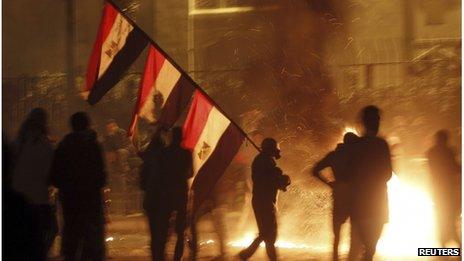Egyptian army deployed in Suez after anniversary unrest
- Published

Egyptian troops have been deployed in Suez and President Mohammed Morsi has appealed for calm after at least seven people died in protests marking the second anniversary of Egypt's uprising.
Six people were killed in Suez and one in Ismailia as police clashed with protesters in several towns and cities.
Critics accuse Mr Morsi of betraying the revolution that toppled former president Hosni Mubarak.
The Islamist president has dismissed the opposition's claims as unfair.
Instead, he has called for a national dialogue, and on Saturday he urged his opponents to refrain from violence.
In a message on Twitter, he called on Egyptians "to adhere to the values of the revolution [and] express opinions freely and peacefully".
In Suez, which saw the worst of Friday's unrest, soldiers took position outside state buildings. The army said the deployment was temporary and aimed at protecting state institutions.
"We have asked the armed forces to send reinforcements on the ground until we pass this difficult period," Adel Refaat, head of state security in Suez, told state television.
In central Cairo, clashes between demonstrators and police were reported into the early hours of Saturday.
'Economy collapsed'
Some protesters have held sit-ins in the capital, saying they will only return home when Mr Morsi leaves office.
On Friday, two years after the start of the uprising against Mr Mubarak's rule, tens of thousands of people turned out to voice their opposition to Mr Morsi and his supporters in the Muslim Brotherhood.
More than 450 people were injured in unrest in 12 out of 27 of Egypt's provinces, the health ministry said.
It was unclear how the deaths in Suez occurred.
Among other cities that saw clashes were Alexandria and Port Said.
In Ismailia, protesters set fire to the headquarters of the Freedom and Justice Party, the political arm of the Muslim Brotherhood.
The city's governorate headquarters was later also stormed.
Protesters have been using the same chants against Mr Morsi as they employed two years ago against Mr Mubarak.
The liberal opposition accuses Mr Morsi of being autocratic and driving through a new constitution that does not protect adequately freedom of expression or religion.
Protester Hany Ragy told the BBC: "We feel our revolution has been stolen"
The government is also being blamed for a deepening economic crisis.
One of the demonstrators at Cairo's Tahrir Square, Momen Asour, said he had come to demand an end to President Morsi's rule. "We have not seen anything, Neither freedom, nor social justice, or any solution to unemployment, or any investment," he said.
"On the contrary, the economy has collapsed."
Another protester, Hamoud Rashid, said the protests were a "natural reaction to the country being in a worse state than it was under Mubarak".
"They have stolen the revolution from the revolutionaries, and we are here to reclaim the revolution," he said.
President Morsi and his allies have dismissed the claim, saying they have a democratic mandate following recent elections. The constitution, drawn up by an Islamist-dominated body, was approved by referendum last month.